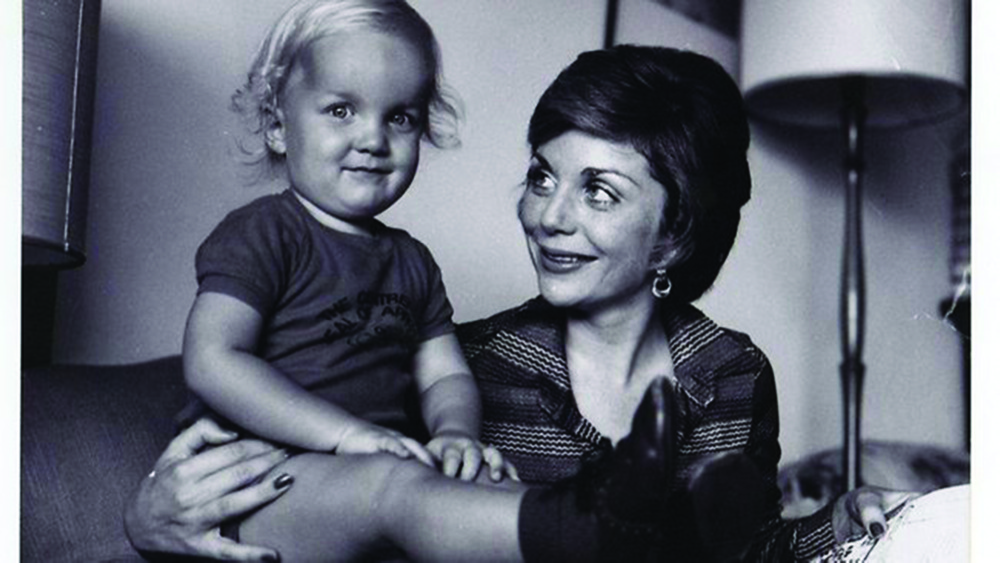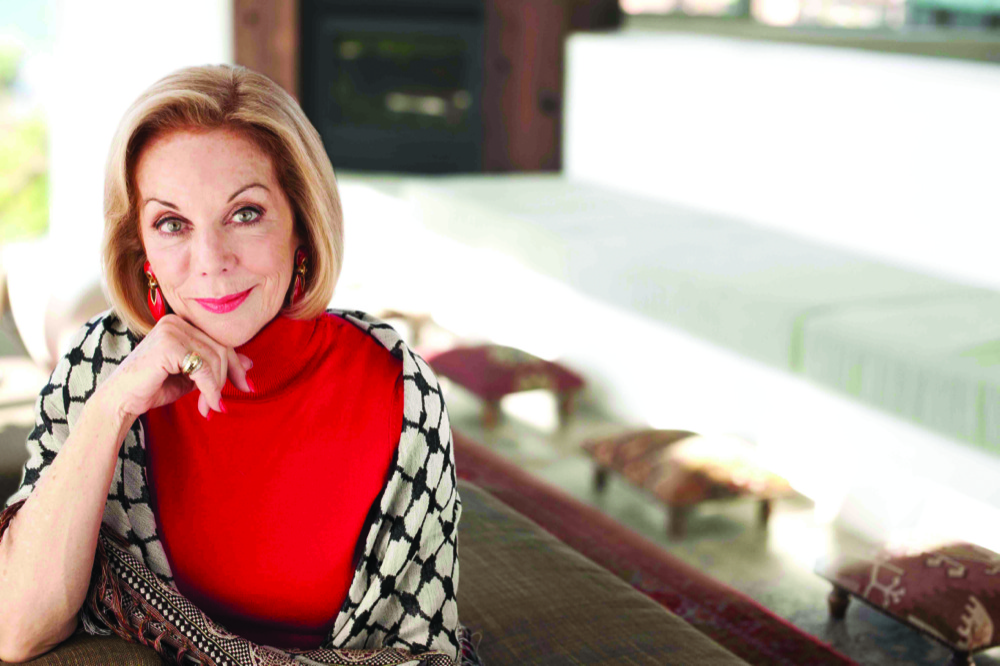“I want to tell people to live their life, to get involved and to never lose your curiosity.”
Reigning Australian of the Year Ita Buttrose says retirement is just not in her vocabulary, saying she wants to encourage a positive approach to ageing, fight stigma, and put a spotlight on medical research. Talking to The Retiree magazine for the first time, she says there is a lot to do… but none of it is impossible.
Ita Buttrose became a national celebrity through her groundbreaking media career. But it’s her remarkable efforts to champion health care issues, particularly dementia, which led to her being named 2013 Australian of the Year.
Buttrose told The Retiree it was “something I certainly wasn’t expecting” and in emotional response on the night she said, “This is one of the proudest moments of my life and I’m truly honoured’’. She told the crowd she would use her new title to reverse what she perceived as “ageist attitudes in our society”, and that ‘’just because you’re old, it doesn’t mean you’re not a person.’’
The publishing icon urged people to adopt preventative health strategies in a bid to combat chronic diseases such as dementia, arthritis, macular degeneration and diabetes. Buttrose said she would further the fight against dementia and shine a spotlight on the importance of medical research.
“We can beat dementia, we can remove the stigma and sense of shame that comes with a diagnosis … if we increase community understanding of dementia, provide better quality care and give hope to the future by research. We can beat dementia if we confront it in the same way we have tackled HIV/Aids, cancer and heart disease – as a community.’’
Since her appointment the once editor of Australian Woman’s Weekly has already used her newfound title to good use with her role bringing dementia research to the agenda forefront, and consequently, dementia has now been recognised as a National Health Priority Area.
In speaking with The Retiree magazine, the former editor-extraordinaire said, “We are asking the government to inject $200 million into dementia research over the next five years.
“We have made a good start with our Fight Dementia campaign in raising awareness and achieving funding for programs to deliver better services and community care packages for people with dementia. The government has made a bold commitment in the Living Longer. Living Better aged care reforms to tackle dementia, but it neglected to allocate any additional money for dementia research.”
Buttrose has used her enormous profile to for acts and causes far nobler than her profession is usually known for. The founding editor of Cleo, is now not only the national president of Alzheimer’s Australia, but also the vice-president emeritus of Arthritis Australia, and patron for the Macular Disease Foundation Australia, to name a few. She also raises awareness of breast cancer,HIV/AIDS, and prostate cancer.

“So, if we are able to design interventions that delay progression, it would be possible for people to have a dementia free life.”
A challenge most common to all of the causes she fights for is stigma. When asked if she believed the stigma attached to Alzheimer’s was still preventing us from moving towards a world without dementia, Buttrose told The Retiree, a most resounding “Yes, I do”. She went on to say, “People often feel a sense of shame when they receive a diagnosis of dementia. No one should feel ashamed”.
Alzheimer’s Disease International released a report last year that found that one-quarter of people with dementia, and one in 10 carers, have admitted to hiding their diagnosis from others because of the stigma attached to the condition.
“Dementia is a chronic disease. It… concerns me that all too often, instead of supporting people at a time of great difficulty and challenge, the instinct for many in our community is to turn their back and walk away,” said the inspiring former editor.
Buttrose informed us of a survey conducted by Eli Lily last year, which found that nearly one in five Australians said that if a family member had memory loss or confusion, they would think it was a natural part of ageing, and that 10 per cent of people aged 19-34 said they had never heard of Alzheimer’s disease, which is incredible, seeing it is the most common form of dementia.
A pilot study of Australian adults aged 40 to 65 years, from the Centre of Health Initiatives at the University of Wollongong, showed equally concerning results which suggested that many in our community hold negative attitudes towards people with dementia. Of the 616 people who responded to the survey, over half indicated that people with dementia cannot be expected to have a meaningful conversation.
Ita’s own father had dementia, so she knows all too well the many issues that caring for a person with dementia presents. And as it is for anyone who has been touched by the disease, it must be a sad example of public perception to hear that one in ten “indicated that they would avoid spending time with a person with dementia”.
Under the leadership of CEO Glenn Rees, Alzheimer’s Australia has been a strong champion for the 321,600 Australians living with dementia. When Rees, who had a long career working in British and Australian public service, saw the opportunity to join Alzheimer’s Australia 13 years ago, it was one he could not resist.
In 2005, through the lobbying and campaigning by organisations including Alzheimer’s Australia, the government implemented the dementia initiative with a promise of $325milion over five years. This was a significant achievement and one that raised the profile of dementia on the public agenda.
To lift its profile it needed a President who was a good communicator and commanded respect in the wider community. To Rees, the answer was Ita Buttrose. She was already a member of the Alzheimer’s Australia NSW advisory committee and a national icon.
“When I met Ita in February 2011, I suggested she might want to be an Ambassador or a champion rather than immersed in the organisation as President,” he remembers, “Ita gave me one of her determined stares that I have come to know so well, and said, ‘Glenn if I take on something, I am fully committed.’ ”
“Ita has been true to her word in every sense. She has been a wonderful spokesperson for our organisation in the community and contributed to the work of the National Board and the governance issues that it involves.” “One of the most powerful strategies we have is to empower people with dementia and their family carers to tell their stories. This is really the essence of our Fight Dementia Campaign, getting across to the wider community what it is like to live with dementia.”

“My attitude to life is youthful; it,s open-minded. I don,t think of age much to be honest.”
“Most recently,” Rees says, “in the 2013 Federal Budget the Gillard government, as part of the Living Longer.Living Better aged care forms, introduced a substantial package to tackle dementia.
“Embedded in the aged care reforms are important measures to introduce financial incentives that recognise the extra cost of dementia care. Importantly, there are also measures for the first time in Australian Health Policy to take actions to achieve a timely diagnosis and make hospitals safer places for those people with dementia,” Rees told The Retiree.
Both Buttrose and Rees believe that hope for the future comes through dementia research and the possibility that we may be able to reduce the numbers of people with dementia.
“There is a window of opportunity to intervene in the progression of dementia because we know the development of the disease process starts 20 years before symptoms become apparent.
“So, if we are able to design interventions that delay progression, it would be possible for people to have a dementia free life. Modelling by economists has shown that if we could delay the onset of dementia by five years, it would over time reduce the number of people with dementia by half,” Rees concluded.
The former copy girl, journalist, and editor-extraordinaire also summed up that the future was tied to research, saying we need to, “… build capacity in dementia research by supporting 150 of the best new researchers to start working on the biggest challenges in the field”.
The Australian of the Year for 2013 did something else heartening apart from winning the award; she did it as a female. There hadn’t been a female winner since Fiona Wood in 2005; in fact, we’ve had only 10 (and a quarter) female Australians of the Year since the award began in 1960.
It was this single working mother who rejoiced when retail trading hours were extended back in 1984, because it had been such a terrible rush cramming all the shopping (while dragging around the kids) into Saturday mornings, the only time shops were open outside of business hours.
So it is fitting that it is this feisty editor, whose brains and strength of character saw her become the first female appointment to the News Ltd board, be the one to bring the award back on track,and acknowledge work done by an Australian woman. And in doing so, Buttrose continues to inspire women and girls around the country.
It is not surprising then, that the women’s rights champion has also thrown her support behind a planned overhaul of Cleo, the groundbreaking masthead she launched in 1972. “I think a lot of them could be a little braver… I would like to see (Cleo) return to more of what it was in the beginning – a magazine with a voice that raised issues for women.” She told Confidential.
Buttrose went on to say she would even consider re-launching Ita, which hit stands in 1994 aimed at women ‘who weren’t born yesterday’. “There’s a compartment in my mind where I keep that idea -it’s not completely gone”, she said.
“My attitude to life is youthful; it’s open-minded,” she said. “I don’t think of age much to be honest. I don’t think about it about myself or other people, say, when I meet them. I want to tell people to live their life, to get involved and to never lose your curiosity.”
Renowned for telling us that retirement is just not in her vocabulary, the reigning Australia of the Year told The Retiree, “I am still curious about everything, and anything, as well as passionate about the things I believe in. There is a lot to do but none of it is impossible.”
Alzheimer’s Australia offers support, information, education and counselling. Contact the National Dementia Helpline on 1800 100 500.
 Ita Buttrose
Ita Buttrose
Macular Degeneration – for me it’s personal!
Macular Degeneration Awareness Week 26 May – 1 June 2013
Championing Macular Degeneration Awareness Week, Ita Buttrose, Australian of the Year 2013, and Patron of the Macular Disease Foundation Australia, is leading the fight against macular degeneration.
Macular degeneration is the leading cause of blindness and vision loss in Australia. One in seven Australians over the age of 50 (1 million people) show some evidence of macular degeneration and this will rise 70%, to 1.7 million, by 2030 in the absence of prevention and treatment measures.
For Ita Buttrose it’s personal, “I was terribly upset when my late father told me he had macular degeneration. As a journalist and author, dad always started the day reading a couple of newspapers, suddenly this was no longer possible. I couldn’t imagine not being able to read again. Macular degeneration is a devastating disease,” said Ita.
CEO of the Macular Disease Foundation Australia, Julie Heraghty said, “There are some key ways we can fight this disease and the first step is to have an eye test and macula check. Secondly, do not ignore any changes in vision. Early detection can literally save your sight. Contact your optometrist immediately if you have any sudden changes in your vision.
“Many people would be surprised to know the importance of diet and lifestyle in reducing the risk and progression of macular degeneration. In fact, smoking may cause blindness, so don’t smoke. Eat dark green leafy vegetables, fresh fruit, fish and take appropriate supplements if required,” said Heraghty.
Australians should also be aware of the symptoms of macular degeneration which can include one or more of the following:
- Difficulty with reading or any other activity with fine vision
- Distortion where straight lines appear wavy or bent
Distinguishing faces becomes a problem
- Dark patches or empty spaces appear in the centre of your vision
“Every Australian over 50 should have an Amsler grid in their home to test for symptoms of macular degeneration. The grid should never replace an eye test and any sudden changes in vision noticed while using an Amsler grid should be reported immediately to your eye care professional,” said Heraghty. “Macular Degeneration Awareness Week is a great reminder to make an appointmentto visit your optometrist today and to contact the Macular Disease Foundation Australia on 1800 111 709 or visit www.mdfoundation.com.au for a free information kit and Amsler grid,” said Ms Buttrose.
[related_ad category=”998″ max_size=”3″ title=”Related Offers”] [related_ad category=”8″ max_size=”3″ title=”Related Stories”]





















Add Comment